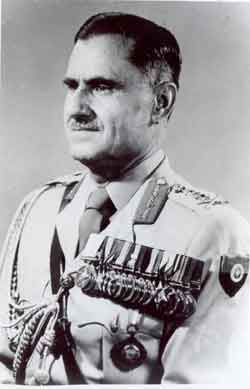Related Research Articles
The Padma Bhushan is the third-highest civilian award in the Republic of India, preceded by the Bharat Ratna and the Padma Vibhushan and followed by the Padma Shri. Instituted on 2 January 1954, the award is given for "distinguished service of a high order...without distinction of race, occupation, position or sex." The award criteria include "service in any field including service rendered by Government servants" including doctors and scientists, but exclude those working with the public sector undertakings. As of 2020, the award has been bestowed on 1270 individuals, including twenty-four posthumous and ninety-seven non-citizen recipients.

General Tapishwar Narain Raina, best known as T.N. Raina, was a senior army officer and a diplomat who served as the 9th Chief of the Army Staff of the Indian Army between 1975 and 1978.

Republic Day is the day when India marks and celebrates the date on which the Constitution of India came into effect on 26 January 1950. This replaced the Government of India Act 1935 as the governing document of India, thus turning the nation into a republic separate from British Raj. The constitution was adopted by the Indian Constituent Assembly on 26 November 1949 and came into effect on 26 January 1950. 26 January was chosen as the date for Republic Day as it was on that day in 1930 when the Declaration of Indian Independence was proclaimed by the Indian National Congress.

The Ministry of Defence (MoD) is charged with coordinating and supervising all agencies and functions of the government relating directly to national security and the Indian Armed Forces. The President of India is the ceremonial commander-in-chief of the armed forces of the country. The Ministry of Defence provides policy framework and resources to the armed forces to discharge their responsibility in the context of the defence of the country. The Indian Armed Forces and Indian Coast Guard under the Ministry of Defence are primarily responsible for ensuring the territorial integrity of India.

Lieutenant General Joginder Singh Dhillon was an officer in the British Indian Army and then the Indian Army. Dhillon Born in Jat Sikh Family. He was the first Army officer to be awarded the Padma Bhushan, given for his role in the 1965 India-Pakistan War, where he was the general officer commanding corps.
Ordnance Factory Board (OFB), consisting of the Indian Ordnance Factories, now known as Directorate of Ordnance was an organisation, under the Department of Defence Production (DDP) of Ministry of Defence (MoD), Government of India. The 41 Indian Ordnance Factories have been converted into 7 Defence Public Sector Undertakings (DPSUs).
Lieutenant General Chenicheri Satish Nambiar is a retired Indian general. He was the first Force Commander and Head of Mission of UNPROFOR, the United Nations Protection Force in the former Yugoslavia during 1992-93. He is the elder brother of former UN Under-Secretary-General Vijay Nambiar.

Lieutenant General Jagjit Singh Aurora, was an Indian Army General Officer who was the General Officer Commanding-in-Chief (GOC-in-C) Eastern Command during the third war with Pakistan in 1971. He organised and led the ground forces campaign in the Eastern Front of the war, which led to an overwhelming defeat of the combined Pakistan Armed Forces in East-Pakistan that led to the creation of Bangladesh.

General Bipin Rawat was an Indian military officer who was a four-star general of the Indian Army. He served as the first Chief of Defence Staff (CDS) of the Indian Armed Forces from January 2020 until his death in a helicopter crash in December 2021. Prior to taking over as the CDS, he served as the 57th Chairman of the Chiefs of Staff Committee of the Indian Armed Forces as well as 26th Chief of the Army Staff (COAS) of the Indian Army.

Air Marshal Padma Bandopadhyay, PVSM, AVSM, VSM, PHS is a decorated former flight surgeon in the Indian Air Force. She was the first woman to be promoted to the rank of Air Marshal in the Indian Air Force. She is the second woman in the Indian Armed Forces to be promoted to a three-star rank, after Surgeon Vice Admiral Punita Arora.

Vijay Kumar Saraswat is an Indian scientist who formerly served as the Director General of the Defence Research and Development Organisation (DRDO) and the Chief Scientific Advisor to the Indian Minister of Defence. He retired on 31 May 2003 and presently member of NITI Aayog i.e. Planning Commission of India and former Chancellor of Jawaharlal Nehru University. and President of Sree Chitra Tirunal Institute for Medical Sciences and Technology, Trivandrum
Ashok Panagariya was an Indian neurologist, medical researcher and academic, known for his research on nerve cells and neuromyotonia. He was a vice chancellor of Rajasthan University of Health Sciences, Jaipur and a member of the Planning Board of the Government of Rajasthan. He was a recipient of the Dr. B. C. Roy Award, the highest Indian award in the medical category. Dr. Ashok Panagariya was awarded the fourth highest Indian civilian award of Padma Shri by the Government of India in 2014. He died on 11 June 2021 due to COVID-19 complications.
The Indian Ordnance Factories Service (IOFS) is a civil service of the Government of India. IOFS officers are Gazetted defence-civilian officers under the Ministry of Defence. They are responsible for the administration of the Indian Ordnance Factories, which provide the indigenous defence production capabilities of India.
Prahlad Kumar Sethi is an Indian physician, medical writer and the chairman of the department of Neurology at Sir Ganga Ram Hospital, New Delhi. He is the founder of Brain Care Foundation, a Delhi-based Trust engaged in the spreading community awareness about brain diseases by dissemination of information. and the author of several publications on neurology and other medical topics, including Medical Second Opinion, a patient’s perspective on how, when and why a second opinion is necessary in medical matters. He is a recipient of the Vishisht Seva Medal for his services to the Indian Armed Forces. The Government of India awarded him the fourth highest civilian honour of the Padma Shri in 2002.

Arvind Lal is an Indian billionaire, pathologist, medical administrator and the chairman and managing director of Dr Lal PathLabs, a medical diagnostic centre in Delhi. A medical graduate and a medical academic, he is reported to have modernized Indian medical diagnostics and initiated the first Public Private Partnership (PPP) in the field of laboratory testing in India. He holds the rank of a Brigadier in the Indian Armed Forces, an honorary rank conferred by the Army. The Government of India awarded him the fourth highest civilian honour of the Padma Shri, in 2009, for his contributions to Medicine.
Sardar Harnarain Singh was an Indian army personnel who held the rank of a major general in the Indian Armed Forces. He was the head of the Rajput Regiment in early 1950s and served as the Military Secretary to Rajendra Prasad, the first President of India, who accompanied the President in his official visits. The Government of India awarded him the third highest civilian honour of the Padma Bhushan, in 1963, for his contributions to Indian Armed Forces.
Puliyur Krishnaswamy Duraiswami (1912–1974) was an Indian orthopedic surgeon, medical writer and the Director General of Health Services under the Government of India. Besides being a Fellow of the Royal College of Surgeons of England and a founder Fellow of the National Academy of Medical Sciences, he published several articles on orthopedics and was a recipient of Robert Jones Medal and the Presidential Merit Award of the British Orthopaedic Association. The Government of India awarded him the third highest civilian honour of the Padma Bhushan, in 1966, for his contributions to the Medical Science.

The Director General Armed Forces Medical Services (DGAFMS) is the head of the Armed Forces Medical Services of the Indian Armed Forces. A three-star rank medical flag officer, the DGAFMS is equivalent to Army Commanders and the Defence Secretary. The DGAFMS is the advisor to the Chief of Defence Staff (CDS) and the Minister of Defence on the medical requirements of the Armed Forces.
Lieutenant-General Patrick Oswald Dunn was an Indian Army general. He commanded the I Corps during the Indo-Pak War of 1965 for which he was awarded the third-highest award of India - the Padma Bhushan.
References
- ↑ "Lt Gen Shahi Takes Over as New DGAFMS" (Press release). Indian Ministry of Defense. 2 November 2002. Retrieved 18 November 2019.
- ↑ "Padma Awards". Ministry of Home Affars (Govt. of India. Archived from the original on 26 May 2021. Retrieved 18 January 2019.
- ↑ "Padma Awards 2004". Outlook India. 25 January 2004.